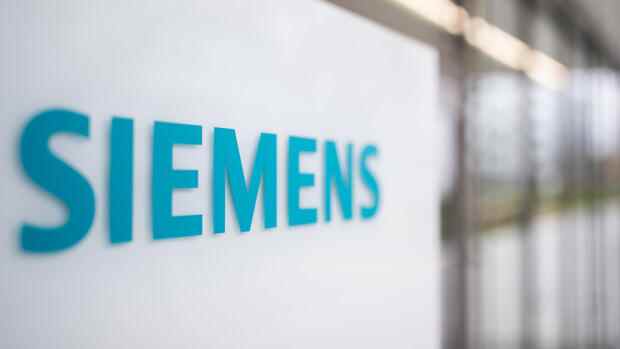Munich The Siemens group posted high losses in the past quarter due to a billion-dollar write-down on its stake in Siemens Energy and other burdens from the withdrawal from Russia. The bottom line was a minus of a good 1.5 billion euros, Siemens announced on Thursday. It is the first quarterly loss in almost twelve years.
Without these special effects, the Dax group is still operationally solid. Siemens also felt challenges such as the lockdowns in China and the increased cost of materials. However, in the third quarter of the financial year, sales increased by a comparable four percent to 17.9 billion euros.
“Siemens is showing many strengths that make me confident,” said CEO Roland Busch. In particular, the digital business continues to grow and the company is gaining market share. The group has “the right strategy to be successful even in uncertain times”.
However, growth has continued to slow down: In the first quarter of 2021/22, Siemens had increased sales by a comparable 17 percent, and then by seven percent in the second.
Top jobs of the day
Find the best jobs now and
be notified by email.
The operating result of the industrial businesses improved – also thanks to sales proceeds – by 27 percent to 2.9 billion euros. That corresponded to a margin of 17 percent. On average, analysts had expected an increase in sales of three percent to 17.5 billion euros and an operating margin of a good 18 percent in the industrial business.
Siemens had warned investors about the special charges. Therefore, the course fell only slightly on Thursday to 108 euros. Order intake was strong, said JP Morgan analyst Andrew Wilson and continued to recommend the stock overweight. Since the beginning of the year, the stock has lost about 30 percent of its value.
On the way to becoming a digital company, the CEO has to deal with legacy issues.
(Photo: via REUTERS)
The high losses in the third quarter have several causes: The main reason is the write-down on the stake in Siemens Energy. The former parent company still holds 35 percent of the shares in the spin-off. Since the price of Siemens Energy has fallen by around 30 percent since the beginning of the year, Siemens reduced the value of the stake by 2.7 billion euros on the books.
Due to the ongoing crisis at the wind power subsidiary Siemens Gamesa, Siemens Energy posted a loss of more than half a billion euros in the third quarter of 2021/22. Those close to Siemens emphasized that the depreciation was purely an accounting effect that did not affect the cash situation.
The second special charge was the exit from the Russian business. Siemens initially stopped new business and then announced its complete withdrawal. This means that the service and maintenance business will also be discontinued. In the second quarter, this already resulted in charges of EUR 600 million. Now another 600 million euros have been added.
Operationally, things were going well for Siemens overall, but there were also effects here that depressed profits. The result at the medical technology subsidiary Healthineers fell by ten percent to 715 million euros due to the slowing boom in rapid corona tests and higher costs.
In the flagship division of digital industries, the operating margin deteriorated as expected from 20.3 to 18.3 percent. On the one hand, bottlenecks in components for highly profitable electronic products were responsible for this. In addition, there is the switch to a “Software-as-a-Service” rental model, which should bring higher earnings for the group in the long term.
Siemens was able to offset these effects with good results, for example in rail technology and intelligent infrastructure. The group therefore largely confirmed the forecast for the year. However, the depreciation effect is now calculated out of the net profit.
Siemens had recently expected sales growth of six to eight percent for the year as a whole. Earnings per share after taxes should increase from 8.32 to 8.70 to 9.10 euros. According to CFO Ralf Thomas, the write-down is now reducing profits by EUR 3.37 per share, so that Siemens now only expects earnings of EUR 5.33 to 5.73 per share.
Siemens is optimistic about the future
Overall, Busch remains optimistic given the continued sales growth and record order backlog of 99 billion euros. The risks of a possible gas shortage are also limited for Siemens, since production is not very energy-intensive. One is prepared to maintain production in the event of a gas crisis.
Even with the competition, things have been going well lately. The Swiss ABB Group increased sales from April to June by a comparable six percent to $7.3 billion. Operating profit (Ebita) improved by nine percent to $1.1 billion, which corresponded to a margin of 15.5 percent.
At the US competitor Rockwell Automation, which they are looking at closely in Munich, sales in the third quarter of 2021/22 (September 30) increased by a comparable seven percent to almost two billion dollars. Operating income improved 11 percent to $409 million, a margin of 20.8 percent. Rockwell slightly lowered the corridor for the growth forecast for the full year.
However, the decisive factor for further development will be whether Siemens’ new digital strategy works. A few weeks ago, Busch announced the new “Xcelerator” digital platform, which is to be used to sell software and hardware from Siemens, but also products from third-party providers on a marketplace.
Busch is convinced that the global uncertainties will tend to increase the demand for automation technology because companies, for example, are bringing production closer to home. The Digital Industries division has already grown disproportionately in the past few months. Sales in the third quarter rose by a comparable 12 percent to 4.9 billion euros. Incoming orders even improved by around a third to 6.5 billion euros.
More: Siemens Energy is in the red because of the ongoing crisis at Siemens Gamesa
